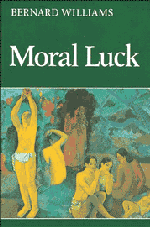Book contents
- Frontmatter
- Contents
- Preface
- Acknowledgements
- 1 Persons, character and morality
- 2 Moral luck
- 3 Utilitarianism and moral self-indulgence
- 4 Politics and moral character
- 5 Conflicts of values
- 6 Justice as a virtue
- 7 Rawls and Pascal's wager
- 8 Internal and external reasons
- 9 Ought and moral obligation
- 10 Practical necessity
- 11 The truth in relativism
- 12 Wittgenstein and idealism
- 13 Another time, another place, another person
9 - Ought and moral obligation
Published online by Cambridge University Press: 05 June 2012
- Frontmatter
- Contents
- Preface
- Acknowledgements
- 1 Persons, character and morality
- 2 Moral luck
- 3 Utilitarianism and moral self-indulgence
- 4 Politics and moral character
- 5 Conflicts of values
- 6 Justice as a virtue
- 7 Rawls and Pascal's wager
- 8 Internal and external reasons
- 9 Ought and moral obligation
- 10 Practical necessity
- 11 The truth in relativism
- 12 Wittgenstein and idealism
- 13 Another time, another place, another person
Summary
Many and various attempts have been made to distinguish different senses of the English term ought. Harman, for instance, has written: ‘A sentence like “Jones ought to take a vacation” intuitively has at least four different interpretations.’ These are said to express: likelihood; desirability, in the sense of something ‘being appropriate’, as in ‘there ought to be more love in the world’; what Harman calls ‘a moral sense’; and ‘a prudential sense’. The first of these certainly exists, even if it is a little strained as applied to the particular example, but it will not concern us further here; in this, as in many other respects, the present discussion makes no pretensions at all to giving a complete account of the term. The so-called ‘prudential sense’, again, we shall come back to later, although it is certainly not well picked out by that phrase. The first question I shall discuss concerns the second and third of the senses which Harman distinguishes. The way in which these two are labelled does not in fact reveal the main point at issue. Clearly the label ‘a moral sense’ cannot succeed in distinguishing anything totally from the second sense, since there is such a thing as moral desirability or appropriateness – indeed the very example of the desire for more love in the world is said to express a moral sentiment. If there is a notion to be isolated here, it seems to have something to do with a more restricted moral notion, such as that of obligation.
- Type
- Chapter
- Information
- Moral LuckPhilosophical Papers 1973–1980, pp. 114 - 123Publisher: Cambridge University PressPrint publication year: 1981
- 29
- Cited by



